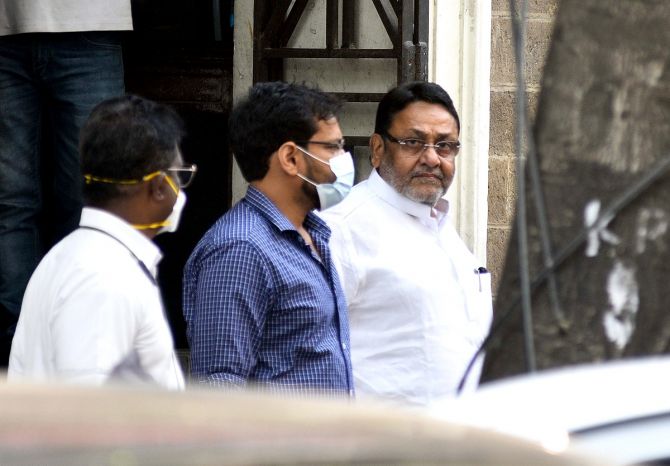The Supreme Court on Wednesday agreed to consider listing for hearing the appeal of jailed Maharashtra minister and Nationalist Congress Party leader Nawab Malik seeking immediate release from prison in a money laundering case.

A bench headed by Chief Justice N V Ramana took note of the submissions of senior lawyer Kapil Sibal, appearing for the NCP leader, and asked him to provide documents to the bench.
"Please give the papers," said the bench which also comprised justices Krishna Murari and Hima Kohli.
The Prevention of Money Laundering Act (PMLA) came into being in 2005 and the minister has been accused under the statute for the alleged offences committed prior to 2000, Sibal said.
Malik was arrested by the ED over a property deal allegedly linked to the aides of gangster Dawood Ibrahim.
Soon after his arrest, the minister had filed a habeas corpus plea in the high court, challenging his arrest and the remand orders.
An appeal was filed recently by Malik challenging an order of the Bombay high court which had rejected his interim application seeking immediate release in the case.
In his plea, Malik has challenged the March 15 order of the division bench of the high court which had rejected the application saying just because the special PMLA court's order remanding him in custody is not in his favour, it does not make that order illegal or wrong.
After the Enforcement Directorate had arrested Malik under the provisions of the PMLA, he had filed a habeas corpus plea in the high court claiming that his arrest by the ED and the consequent remands were illegal.
The high court had said that Malik's counsel had argued before the PMLA court and vehemently opposed the ED's request for the minister's custody.
'There is also merit in the submissions of the Additional Solicitor General (ASG) that merely because the special court granted the custody of petitioner (Malik) would not make that order illegal ipso facto because the petitioner is aggrieved,' the high court had said.
The high court had said that Malik was arrested by the ED in accordance with the law, and subsequently been remanded to the probe agency's custody and then to judicial custody following due process.
It had noted that Malik had gone to the ED's office for questioning on February 23, the day he was arrested, in response to previous summons issued to him by the central agency.
He was then issued an arrest order and taken into custody by the ED, the high court had said.
'In the present case, there is no dispute on the factual aspect that custody order is passed by the competent court of jurisdiction- the special court,' the high court had said.
'And secondly, merely because the order is against the petitioner, it cannot be termed as patently illegal,' the court had said.
The high court had said that Malik's petition had raised some debatable issues and the court needed to hear at length the arguments from both sides before passing any final orders.
The central agency has accused Malik of being part of an alleged criminal conspiracy to usurp a property in Mumbai's Kurla area which currently has a market value of Rs 300 crore and belongs rightfully to one Munira Plumber.
Malik had contended before the high court that he had bought the property in a bona fide transaction three decades ago, and Plumber has now changed her mind about the transaction.










 © 2025
© 2025